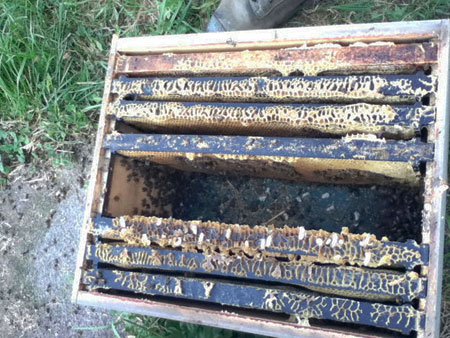|

by Jon Radojkovic
June 19, 2013
from
ThePost Website

One of many dead
hives
at Schuit's Saugeen
Honey, in Elmwood, Canada.
ELMWOOD
Local beekeepers are finding millions of
their bees dead just after corn was planted here in the last few
weeks.
Dave Schuit, who has a honey
operation in Elmwood, lost 600 hives, a total of 37 million bees.
"Once the corn started to get
planted our bees died by the millions," Schuit said.
He and many others, including the
European Union, are pointing the finger at a class of
insecticides known as neonicotinoids, manufactured by
Bayer CropScience Inc. used in planting corn and some other crops.
The European Union just recently voted
to ban these insecticides for two years, beginning December 1, 2013,
to be able to study how it relates to the large bee kill they are
experiencing there also.
Local grower Nathan Carey from the Neustadt, and National
Farmers Union Local 344 member, says he noticed this spring the lack
of bees and bumblebees on his farm.
He believes that there is a strong
connection between the insecticide use and the death of pollinators.
"I feel like we all have something
at stake with this issue," he said.
He is organizing a public workshop and
panel discussion about this problem at his farm June 22 at 10 a.m.
He hopes that all interested parties can get together and talk about
the reason bees, the prime pollinators of so any different plant
species, are dying.
At the farm of Gary Kenny, south west of Hanover, eight of
the 10 hives he kept for a beekeeper out of Kincardine, died this
spring just after corn was planted in neighboring fields.
What seems to be deadly to bees is that the neonicotinoid
pesticides are coating corn seed and with the use of new air
seeders, are blowing the pesticide dust into the air when planted.
The death of millions of pollinators was looked at by American
Purdue University.
They found that,
"Bees exhibited neurotoxic symptoms,
analysis of dead bees revealed traces of thiamethoxam/clothianidin
in each case."
Seed treatments of field crops
(primarily corn) are the only major source of these compounds.
Local investigations near Guelph, led to the same conclusion.
A Pest Management Regulatory Agency
investigation confirmed that corn seeds treated with
clothianidin or
thiamethoxam,
"contributed to the majority of the
bee mortalities" last spring.
"The air seeders are the problem," said Ontario Federation of
Agriculture director Paul Wettlaufer, who farms near Neustadt.
This was after this reporter called
John Gillespie, OFA Bruce County president, who told me to call
Paul Wettlaufer.
Unfortunately, Wettlaufer said it was,
"not a local OFA issue," and that it was an issue for the Grain
Farmers of Ontario and representative, Hennry Vanakum should
be notified.
Vanakum could not be reached for
comment.
Yet Guelph University entomologist Peter Kevan, disagreed
with the EU ban.
"Thereís very little evidence to say
that neonicotinoids, in a very general sense, in a broad scale
sense, have been a major component in the demise of honeybees or
any other pollinators, anywhere in the world," said Kevan.
But research is showing that honeybee
disorders and high colony losses have become a global phenomena.
An international team of scientists led
by Hollandís Utrecht University concluded that,
"Large scale prophylaxic use in
agriculture, their high persistence in soil and water, and their
uptake by plants and translocation to flowers, neonicotinoids
put pollinator services at risk."
This research and others resulted in
the European Union ban.
The United Church is also concerned about the death of so many
pollinators and has prepared a "Take Action" paper itís sending out
to all its members. The church is basing its action on local
research.
The Take Action paper states
among other things,
"Scientific information gathered
suggests that the planting of corn seeds treated with
neonicotinoids contributed to the majority of the bee
mortalities that occurred in corn growing regions of Ontario and
Quebec in Spring 2012."
Meanwhile Schuit is replacing his queen
bees every few months now instead of years, as they are dying so
frequently.
"OMAFRA tells me to have faith.
Well, I think itís criminal what is happening, and itís hard to
have faith if it doesnít look like they are going to do anything
anyway," Schuit says.
|

